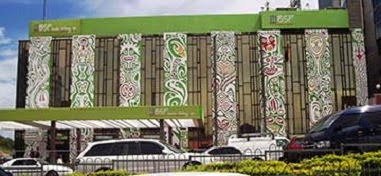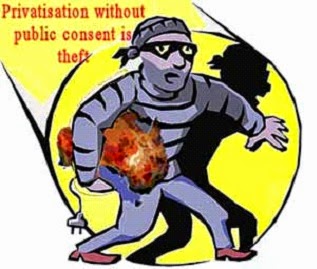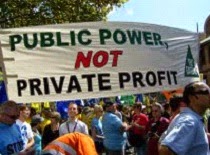Advantages and disadvantages of privatisation in PNG and the PNG Power controversy

Source: Bush Economist on PNG Blogs
This is the story of privatisation of public enterprises.
Privatisation first reared its head in PNG with the demise of the government owned Papua New Guinea Banking Corporation. Its landmark Port Moresby headquarters still shows the PNG traditional art forms and icons that around the time of independence we proudly displayed as evidence of our unique culture, but nowdays allow elected fools such as Theo Zureonuc and Loujaya Kousa label as satanic. PNGBC was the bank of the people with the goal of service, not profit.
We now have BSP in its place. BSP is majority owned by private shareholders and its profit since 2012 has grown at rates of 10-25% each year, leading to the 2013 result of nearly K437 million. That’s not income, it is profit and a hell of a lot of money by PNG standards. Divided up amongst every single person living in PNG, from baby up to papa na mama, each one would have received K62 for 2013.
BSP has what it proudly states to be over one million account holders in PNG. To help earn its fat profit, BSP knifes us with service fees for every little thing. In other countries, using an ATM usually costs nothing, whether you are making a payment or withdrawing cash. The reason is that automated transactions save the bank a huge amount of money compared to if the banks have to handle hard cash and manual withdrawals from bank windows (which also cost nothing in banks in many countries, including Australia).
In PNG, BSP happily charges us for every move we make in banking. We’re screwed out of our money, rarely less than K1.50 at a time, no matter how much the bank saves through these features. Not even people in the wealthy developed countries are treated by their banks the way BSP treats us. All banks would love to make these charges but the governments in other countries prohibit it.
BSP makes so much money in such a small economy that it has been saluted internationally. In “The Banker” 2012 list of Top 1000 banks in the world, it was rated #4 in Profit on Average Capital, and #3 in Top 5 returns on capital in the Asia Pacific region.
The problem is these profits come out of the pockets of hardworking, often grassroots people in PNG, the Solomons and Fiji. Yes, it is true that the major PNG superannuation funds have big investments in BSP. But the profits from superannuation payouts only benefit workers. What percent of the working force in PNG is actually employed? In 2014 it is less than 20%. And what percent of that 20% has a job that pays enough to be making more than minimum wage and actually being able to benefit from superannuation funds? I can’t give you that figure, but I would believe that it is low.
Also, before BSP took over PNGBC, private citizens could purchase shares in the business. Back then, the price of investment would have been quite low since BSP in 1995 was an unknown tiny bank. The prospect was that an investment then could make a fortune once the bank became large. Naturally, only those in the know and having the money would have done so.
Supposedly, former PM Mekere Morauta was one of the big early investors, but as he was serving the government all during this time in important banking or political positions, including that of Prime Minister when PNGBC was privatised, would this not represent unethical conflicts of interest? Our politicians engage in conflict of interest business dealings all the time and think nothing of it even though it is clearly unethical to use the public time and privileged knowledge to make money from that benefits the individual.
Investing in government organisations taken private has become an ideal way in PNG to launder corruptly obtained money into respectable investments. Ministerial and MP tongues are hanging in anticipation at the proposed privatisation of 51% of Air Niugini and PNG Power. Obviously, nearly all MPs who can come up with substantial monies to invest did not come by that money ethically or perhaps even legally. It is simply not possible to make so much money so fast if you are earning it honestly and ethically.
Government always argues that services will improve under privatisation. When PNGBC was privatised into BSP there was no improvement, only longer lines and more fees. BSP didn’t even move into rural areas like it originally promised. Today it is doing so, but probably PNGBC would be doing the same if it were still here, because increasing rural populations make the provision of rural service a better investment.
BSP’s original and false promise to move into rural areas did not make sense from the start as something a private business would do. Profits lie in serving city people, not scattered rural people. It doesn’t matter what service you’re talking about. When people are scattered out over a big area in small communities it costs more to bring them medicine, schools, electricity, mobile phone service, or banking, because you have to divide what is often a much more costly infrastructure in rural areas by the smaller population size. The cost per person is much bigger, yet rural people are less able to afford the service. That’s why rural services nearly always either decline after privatisation, are kept to the bare minimum, or rural people made to pay more than city people for the services.
 The original reason why privatisation was attractive to governments around the world is that it seemed to overcome the problem of slack workers at government institutions, compared to harder working staff in the private company equivalents. The only reason why workers are slack in government is that it is harder to sack the nonperformers. Private companies do not operate under public service rules. They are free to hire and terminate however they want. Job cutting can be severe, even cruel if the company justifies this as essential to protecting their profits.
The original reason why privatisation was attractive to governments around the world is that it seemed to overcome the problem of slack workers at government institutions, compared to harder working staff in the private company equivalents. The only reason why workers are slack in government is that it is harder to sack the nonperformers. Private companies do not operate under public service rules. They are free to hire and terminate however they want. Job cutting can be severe, even cruel if the company justifies this as essential to protecting their profits.
It is quite doable to change the public service code or exempt state owned enterprises from the code so that employee productivity is increased in a government department. This is especially true in PNG, where citizens rarely protest effectively about anything the government does. It also relatively straightforward to structure a state owned enterprise to be free from political interference. Besides, being a private company is no guarantee against political interference. Remember back to the early 90s battles between Sir Michael Somare and Sir Dennis Buchanan’s Talair, once the world’s largest third level carrier and operating only in PNG. Buchanan ended up closing down the air carrier over Somare’s politicial obstructionism of Talair being able to expand its operations.
Thus, there is really no reason to privatise a state owned enterprise or any public service, except to generate money for the private pocket. Having a privatised institution generate higher revenue and attractive profits often does not translate into better service, especially in PNG where there is no active consumer protection. The option always exists to reinvest profits into creating improved service, but the temptation is usually higher to take higher profits that are generated by increased efficiency and pay them out to the shareholders. Rather than the rich helping to support the poor, it is the other way around in privatisation of government services.
Even the change of a government service provider into a state owned enterprise ends up destroying the whole reason for government provided services, and ends up penalising those least able to afford it. Thus, once Air Niugini became an SOE, it more strictly imposed excess baggage charges on lower income travellers bringing rural food to their city relatives as baggage. It made Simbu Provincial government start paying for Air Niugini providing service to Kundiawa. Enga was forced into the same situation. At the same time that Air Niugini was coming down hard on the poor, it started a rewards programme for frequent fliers, opened up comfortable, food stocked VIP lounges for the more affluent, and in other ways showed that the era of kindness to everyone was over.
Telikom is another story. A few years ago it stopped following the normal government moral responsibility of providing service to all. It focused its wholly owned mobile phone service, Citifone, on selected urban areas alone, where profits are higher. Not only does this show a callous disregard for the principle of fairness and equality as embodied under our PNG constitution, it gives a green light to all private mobile phone companies to do the same as it did and abandon rural people completely. Even Digicel, while providing service through its tower network widely to rural areas, puts the big money into providing service to city people. Rural coverage often sucks even within the stated Digicel rural service areas.
When government services are privatised not to foreign investors rather than to majority ownership domestic superannuation funds, far less money returns to the citizens of the country. Essentially, such a transfer results in an overall loss of sovereignty and increase in dependency on foreigners. The current government is undisturbed by this loss of sovereignty.
Looking at the costs and benefits of privatisation, it is clear that PNG privatisation has mostly been an opportunity for a privileged few in PNG to invest and reap sometimes excellent financial returns by investing into newly privatised services, or investing in small companies that sometimes pop up from nowhere to swallow a large government enterprise. Privatisation also provides a rare opportunity (the proposed 5 star casino would have been another such opportunity had it gotten off the ground) to launder large amounts of unethically or illegally obtained money into a respectable, legal investment, thus hiding the original source of the money and somewhat protecting the investor.
Privatisation absolves the government’s moral responsibility to provide essential services both to the haves and the have nots in our society. It frees private enterprise to either reduce services to the rural poor, eliminate the service altogether, or force rural people to pay a greater percentage of their limited income to keep the service intact.
The main benefits that privatisation brings to citizens through reduced costs or improved services mostly goes to city dwellers. The rural poor nearly always suffer from privatisation.
Every government starting with the Mekere Morauta administration, has supported the process of privatisation. None see any problem with violating our constitutional mandate of fairness and equality, which itself comes from our traditional community emphasis on sharing, kindness, and distribution of wealth. The egalitarian nature that bound our traditional values to more recent Christian ones, is now being thrown out the window in order to focus on efficiency and profits.
I personally support the strike actions of PNG Power employees. We must not let foreign investors take another essential government service and turn it into a profit generating machine, of which most profits will transfer overseas. If we have to suffer power shortages as a result of strike actions, don’t blame the power workers. Instead blame the government for its callous disregard for the general welfare and its fixation on making money for the privileged few.
I disagree with the workers that providing electricity to the people should be allowed to convert into a profit making business. The provision of electricity should never be based on profit. Throughout the world, electricity has become almost as essential as health care, education, and water. Economical electricity is the only way to encourage more people to remain in rural areas and develop the land.
 The traditional role of government is never to make business. The purpose of government is to protect the people and provide basic services to all by equitably sharing the revenue it generates. Government is obligated to serve villagers as much as it serves those living in towns and cities. Everyone should benefit from government services simply because they are citizens Under no circumstances should poorer people be penalised. It is morally wrong.
The traditional role of government is never to make business. The purpose of government is to protect the people and provide basic services to all by equitably sharing the revenue it generates. Government is obligated to serve villagers as much as it serves those living in towns and cities. Everyone should benefit from government services simply because they are citizens Under no circumstances should poorer people be penalised. It is morally wrong.
In PNG, government businesses have been the gateway to widespread looting of revenues and increasing corruption. Privatising a State Owned Enterprise to get away from this problem only creates new ones. Once a government service provider is privatised, moral obligations to serve all citizens, even the most disadvantaged, tend to disappear. Private companies in PNG have no legal obligation to maintain service. They are free to make as much profit as they can, no matter how it affects the poor.
That is why privatisation has been a mistake for PNG and should be opposed by all caring people.
- rait man's blog
- Log in to post comments
